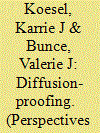| Srl | Item |
| 1 |
ID:
094088


|
|
|
|
|
| Publication |
2010.
|
| Summary/Abstract |
What explains electoral stability and change in competitive authoritarian regimes? This article addresses the question by comparing eleven elections-six of which led to continuity in authoritarian rule and five of which led to the victory of the opposition-that took place between 1998 and 2008 in competitive authoritarian regimes countries located in the postcommunist region. Using interviews conducted with participants in all of these elections and other types of data and constructing a research design that allowed the authors to match these two sets of elections on a number of important dimensions, they assess two groups of hypotheses-those that highlight institutional, structural, and historical aspects of regime and opposition strength on the eve of these elections and others that highlight characteristics of the elections themselves. The authors conclude that the key difference was whether the opposition adopted a tool kit of novel and sophisticated electoral strategies that made them more popular and effective challengers to the regime.
|
|
|
|
|
|
|
|
|
|
|
|
|
|
|
|
| 2 |
ID:
127118


|
|
|
|
|
| Publication |
2013.
|
| Summary/Abstract |
Do authoritarian leaders take preemptive actions to deter their citizens from joining cross-national waves of popular mobilizations against authoritarian rulers? Are they more likely to engage in such behavior when these uprisings appear to be more threatening-in particular, when they take place in neighboring countries and in regimes that resemble their own? We provide answers to these questions by comparing the responses of the Russian and Chinese leadership to two such waves: the color revolutions and the Arab uprisings. We conclude that, despite differences in the ostensible threats posed by these two waves, they nonetheless prompted the leaders of both of these countries to introduce similar preemptive measures in order to "diffusion-proof" their rule from the color revolutions and the Arab upheavals. These findings have some important implications for our understanding of authoritarian politics and diffusion processes. One is to reinforce the emphasis in many recent studies on the strategic foundations of authoritarian resilience. That recognized, however, we would add that the authoritarian toolkit needs to be expanded to include policies that preempt international, as well as domestic threats. The other is to provide further confirmation, in this case derived from the behavior of authoritarian rulers, of how scholars have understood the drivers of cross-national diffusion. At the same time, however, we counsel students of diffusion to pay more attention to the role of resisters, as well as to adopters. In this sense, the geographical reach of diffusion is much broader than many analysts have recognized.
|
|
|
|
|
|
|
|
|
|
|
|
|
|
|
|